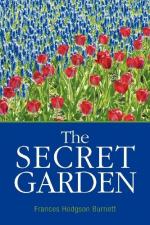He began to walk about, looking up in the trees and at the walls and bushes with a thoughtful expression.
“I wouldn’t want to make it look like a gardener’s garden, all clipped an’ spick an’ span, would you?” he said. “It’s nicer like this with things runnin’ wild, an’ swingin’ an’ catchin’ hold of each other.”
“Don’t let us make it tidy,” said Mary anxiously. “It wouldn’t seem like a secret garden if it was tidy.”
Dickon stood rubbing his rusty-red head with a rather puzzled look.
“It’s a secret garden sure enough,” he said, “but seems like some one besides th’ robin must have been in it since it was shut up ten year’ ago.”
“But the door was locked and the key was buried,” said Mary. “No one could get in.”
“That’s true,” he answered. “It’s a queer place. Seems to me as if there’d been a bit o’ prunin’ done here an’ there, later than ten year’ ago.”
“But how could it have been done?” said Mary.
He was examining a branch of a standard rose and he shook his head.
“Aye! how could it!” he murmured. “With th’ door locked an’ th’ key buried.”
Mistress Mary always felt that however many years she lived she should never forget that first morning when her garden began to grow. Of course, it did seem to begin to grow for her that morning. When Dickon began to clear places to plant seeds, she remembered what Basil had sung at her when he wanted to tease her.
“Are there any flowers that look like bells?” she inquired.
“Lilies o’ th’ valley does,” he answered, digging away with the trowel, “an’ there’s Canterbury bells, an’ campanulas.”
“Let us plant some,” said Mary.
“There’s lilies o’ th’ valley here already; I saw ’em. They’ll have growed too close an’ we’ll have to separate ’em, but there’s plenty. Th’ other ones takes two years to bloom from seed, but I can bring you some bits o’ plants from our cottage garden. Why does tha’ want ’em?”
Then Mary told him about Basil and his brothers and sisters in India and of how she had hated them and of their calling her “Mistress Mary Quite Contrary.”
“They used to dance round and sing at me. They sang—
’Mistress Mary, quite
contrary,
How does your garden grow?
With silver bells, and cockle shells,
And marigolds all in a row.’
I just remembered it and it made me wonder if there were really flowers like silver bells.”
She frowned a little and gave her trowel a rather spiteful dig into the earth.
“I wasn’t as contrary as they were.”
But Dickon laughed.
“Eh!” he said, and as he crumbled the rich black soil she saw he was sniffing up the scent of it, “there doesn’t seem to be no need for no one to be contrary when there’s flowers an’ such like, an’ such lots o’ friendly wild things runnin’ about makin’ homes for themselves, or buildin’ nests an’ singin’ an’ whistlin’, does there?”




